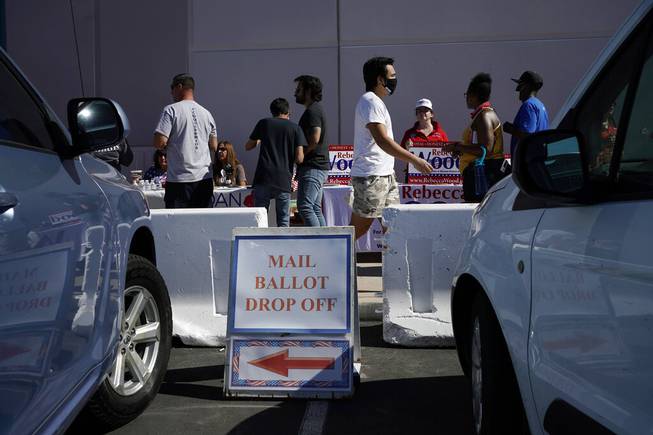
John Locher / AP
In this June 9, 2020, file photo, a sign indicates where mail ballots may dropped off as people wait in line at one of a few in person voting places during a nearly all-mail primary election in Las Vegas.
Tuesday, May 25, 2021 | 10:46 p.m.
Related Content
CARSON CITY — Extensive election reform bills supported by Nevada Democrats passed out of their second committee Tuesday night, inching forward as the end of the legislative session looms large.
Bills that would make Nevada the first presidential primary in the country, make permanent many of the voting changes put into place during the COVID-19 pandemic, and make changes to the state’s voter registration system were passed out of the money-focused Assembly Committee on Ways and Means on Tuesday.
Lawmakers spent the majority of the hearing debating the cost of the measures. Assembly Bill 321, which would automatically send mail-in ballots to active, registered voters in Nevada, received the most debate over cost.
Fiscal notes from the secretary of state’s office claimed the bill would cost $5.7 million more each fiscal year, a number that bill sponsor and Assembly Speaker Jason Frierson, D-Las Vegas, took umbrage with.
The total cost for the 2020 election, including expanded mail-in voting was $3.9 million, Frierson said.
“When we open up these issues, I think there’s a tendency for folks to look for the ideal and say, ‘Well, since we’re opening up anyway, let’s find an ideal way to do all of this,’ which is not always necessary or practical,” Frierson said.
Mark Wlaschin, the deputy secretary of state for elections, said that an increase of around 100 ballot drop-off boxes at around $1,500 apiece, coupled with the secretary of state not fully reimbursing counties in the 2020 election, will cause an increase in price.
The state did not fully reimburse county election departments due to federal funding from the CARES Act being available. The secretary of state’s office opposed the bill.
The committee also heard Assembly Bill 126, which would switch Nevada to a first-in-the-nation primary. The bill comes after the chaotic 2020 Iowa caucuses had such a delay in results that many prominent Democrats backed ending caucuses outright.
The bill also calls for a presidential primary to replace the caucusing process, where Nevada is one of a handful of states that still tabs its presidential delegates using the caucusing system
Former Senate Majority Leader Harry Reid has been a stalwart proponent of moving Nevada to the front of the line in presidential nominating contests due to the state’s diversity in comparison to current kickoff states New Hampshire and Iowa.
This could be an issue, however, as those two states have been fiercely protective of their positions in the lineup over the years. New Hampshire state law also allows the New Hampshire secretary of state to move the primary date unilaterally, and stipulates it must be held before any “similar contest,” setting up a potential showdown between the states.
“I’m affectionately attached to our caucus system but also know that it’s time to evolve and move on,” Assembly Majority Floor Leader Teresa Benitez-Thompson, D-Reno, said
Wlaschin estimated that future primary cycles will cost the state $5.2 million. Switching to a primary will not lead to any extra expenses during the next biennium, since the next presidential election isn’t until 2024.
The election bills heard Tuesday had each passed through committees earlier in the session, but had to pass through Ways and Means as well due to their fiscal notes. They will now be sent to the Assembly floor, where they are expected to pass.
